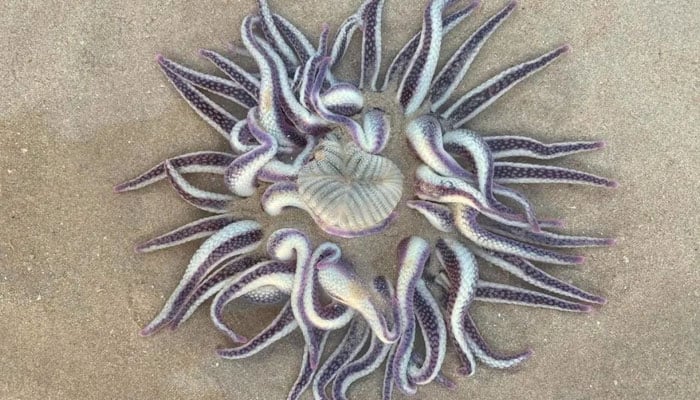Dog walker spots rare, dangerous sea creature on beach in Australia
"This species is one of the largest and certainly the most dangerous Australian anemones," study says
Imagine taking a nice stroll on a spotless beach and coming across one of the ocean's deadliest animals.
Walking her dogs along the sandy beaches of Broome, in northwest Australia, Dianne Bennett came across an unusual sight, the Miami Herald reported.
At first, what seemed to be a group of eels tucked into the shallow waters during low tide turned out to be the Dofleinia Armata, more menacingly known as the "armed anemone."
Its uncommon, purple, tentacle-laden form hides a hidden danger: a sting that may cause agonising wounds that could take months to cure.
Bennet told the local media: "I discovered it while walking my dogs in an intertidal area at very low tide. My initial thought was, 'There's a weird bunch of eels going down a hole.'"
According to a report published in 2004, "This species is one of the largest and certainly the most dangerous Australian anemones. Contact with it can produce extremely painful wounds that may take one to several months to heal."
According to the experts, an armed anemone's body is around eight inches in diameter, and its tentacles can extend up to 20 inches in length. The animal frequently curls into a ball, hiding its mouth and obscuring its full size.
-
Woman allegedly used ChatGPT to plan murders of two men, police say
-
UK seeks ‘best possible deal’ with US as tariff threat looms
-
Sterling K. Brown's wife Ryan Michelle Bathe reveals initial hesitation before taking on new role
-
Rising energy costs put UK manufacturing competitiveness at risk, industry groups warn
-
Liza Minnelli recalls rare backstage memory with mum Judy Garland in new memoir
-
Armed intruder shot dead at Trump's Mar-a-Lago residence: US Secret Service
-
Kurt Russell spills the beans on his plans for milestone birthday this year: 'Looking forward to it'
-
11-year-old allegedly kills father over confiscated Nintendo Switch












